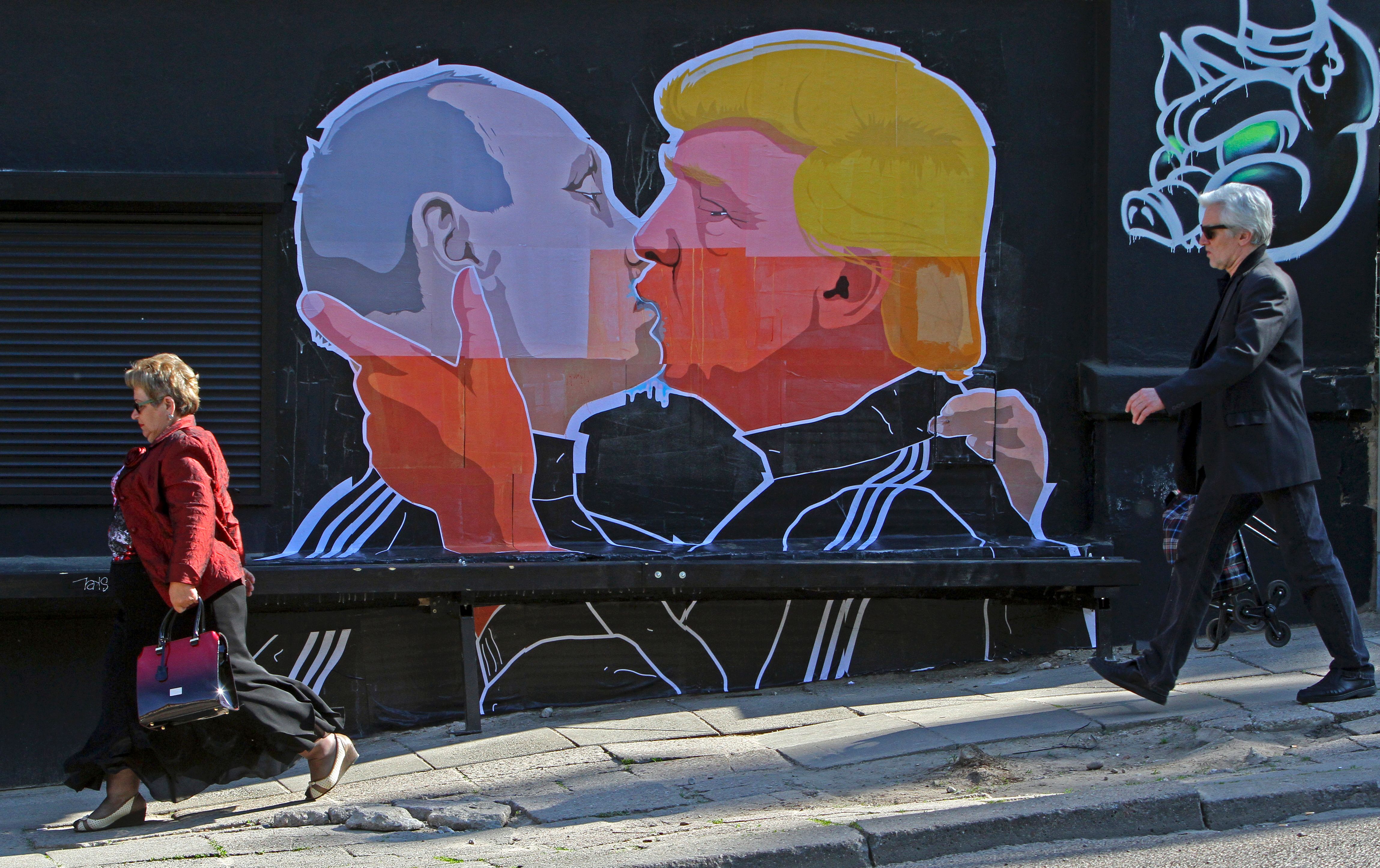Trump's favorite foreign leader
Hint: It isn't David Cameron


A free daily email with the biggest news stories of the day – and the best features from TheWeek.com
You are now subscribed
Your newsletter sign-up was successful
Vladimir Putin is a thug. On this, I suspect, most people outside his country's borders would agree. In recent years, Russia's new czar has started a new Cold War, invaded and annexed Crimea, ignited a civil war in Ukraine, and propped up a genocidal dictator in Syria. At home, journalists and opposition leaders who've dared to criticize Putin have been beaten, jailed, shot, and poisoned. Now we've learned the lying dictator even rigged the Olympic Games in Sochi, turbocharging his athletes with steroids and substituting clean urine for their tainted samples. In a great irony, Putin has exploited the West's tradition of free speech by funding a TV network, RT — formerly called Russia Today — here and in Europe, spewing out a steady stream of pro-Russian, anti-American propaganda. On RT, there's just one American political leader who is routinely praised; his election, Putin's stooges say, may lead to "improved relations between the U.S. and Russia." Guess who?
The admiration goes both ways. Donald Trump has called Putin "a strong leader" and says it's "an honor" to receive his praise. Improved relations with Russia are "absolutely possible," Trump said in his recent policy speech. "This horrible cycle of hostility must end and ideally will end soon." At the speech, Putin's beaming U.S. ambassador was seated in the front row. Trump's campaign chairman, Paul Manafort, has specialized in giving political and tactical advice to foreign authoritarian leaders, including Phillipines strongman Ferdinand Marcos and Angola's Soviet-backed "freedom fighter'' Jonas Savimbi, and was chief adviser to former Ukranian president Victor Yanukovych — a Putin puppet — until a revolution forced Yanukovych to flee to Putin's protection in Russia. If elected president, it seems, Trump will not only turn Washington upside down — he'll turn American foreign policy on its head, too. Trump is feuding with British Prime Minister David Cameron, who has criticized his proposed ban on Muslims entering the U.S. "Looks like we're not going to have a very good relationship," Trump said this week. He's also not fond of NATO, saying it may be "obsolete." It's an intriguing new worldview: The United Kingdom, a hostile nation. Europe, a parasite on U.S. military strength. Putin? A potential ally, and perhaps a role model.
A free daily email with the biggest news stories of the day – and the best features from TheWeek.com
The Week
Escape your echo chamber. Get the facts behind the news, plus analysis from multiple perspectives.

Sign up for The Week's Free Newsletters
From our morning news briefing to a weekly Good News Newsletter, get the best of The Week delivered directly to your inbox.
From our morning news briefing to a weekly Good News Newsletter, get the best of The Week delivered directly to your inbox.
William Falk is editor-in-chief of The Week, and has held that role since the magazine's first issue in 2001. He has previously been a reporter, columnist, and editor at the Gannett Westchester Newspapers and at Newsday, where he was part of two reporting teams that won Pulitzer Prizes.
-
 Democrats push for ICE accountability
Democrats push for ICE accountabilityFeature U.S. citizens shot and violently detained by immigration agents testify at Capitol Hill hearing
-
 The price of sporting glory
The price of sporting gloryFeature The Milan-Cortina Winter Olympics kicked off this week. Will Italy regret playing host?
-
 Fulton County: A dress rehearsal for election theft?
Fulton County: A dress rehearsal for election theft?Feature Director of National Intelligence Tulsi Gabbard is Trump's de facto ‘voter fraud’ czar
-
 The billionaires’ wealth tax: a catastrophe for California?
The billionaires’ wealth tax: a catastrophe for California?Talking Point Peter Thiel and Larry Page preparing to change state residency
-
 Bari Weiss’ ‘60 Minutes’ scandal is about more than one report
Bari Weiss’ ‘60 Minutes’ scandal is about more than one reportIN THE SPOTLIGHT By blocking an approved segment on a controversial prison holding US deportees in El Salvador, the editor-in-chief of CBS News has become the main story
-
 Has Zohran Mamdani shown the Democrats how to win again?
Has Zohran Mamdani shown the Democrats how to win again?Today’s Big Question New York City mayoral election touted as victory for left-wing populists but moderate centrist wins elsewhere present more complex path for Democratic Party
-
 Millions turn out for anti-Trump ‘No Kings’ rallies
Millions turn out for anti-Trump ‘No Kings’ ralliesSpeed Read An estimated 7 million people participated, 2 million more than at the first ‘No Kings’ protest in June
-
 Ghislaine Maxwell: angling for a Trump pardon
Ghislaine Maxwell: angling for a Trump pardonTalking Point Convicted sex trafficker's testimony could shed new light on president's links to Jeffrey Epstein
-
 The last words and final moments of 40 presidents
The last words and final moments of 40 presidentsThe Explainer Some are eloquent quotes worthy of the holders of the highest office in the nation, and others... aren't
-
 The JFK files: the truth at last?
The JFK files: the truth at last?In The Spotlight More than 64,000 previously classified documents relating the 1963 assassination of John F. Kennedy have been released by the Trump administration
-
 'Seriously, not literally': how should the world take Donald Trump?
'Seriously, not literally': how should the world take Donald Trump?Today's big question White House rhetoric and reality look likely to become increasingly blurred
